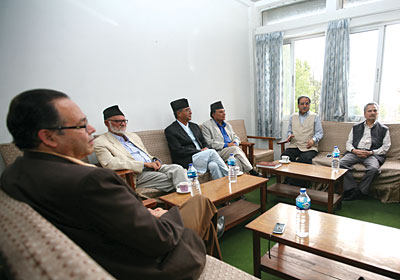 KIRAN PANDAY |
The Maoists remain the strongest organised force. Their internal assessment is that despite greater disillusionment, voters are willing to give them another chance. This week's revelation that 65 per cent Nepalis are poor shows why the Maoists have a readymade constituency. Ethnic minorities and Dalits continue to invest hopes in them. They are the richest party around, and are capable of instilling fear in their adversaries.
Those who see it this way argue in favour of the present political line. They say that 'institutionalising existing achievements' through a constitution would be a major achievement. If it requires certain compromises on the PLA, so be it, for the Maoists would then remain an invincible force because of their mass-based fronts. But if this line had prevailed and Maoists were sure of electoral success, they would have pushed for a constitution by May 28 this year.
The counter-argument is there are no guarantees in electoral politics. Public sentiment is fickle. Rivals will not be complacent, and 'reactionaries and expansionists' will do whatever is required to defeat the Maoists. This is why there can be no compromises on the PLA till there is a guarantee that a 'progressive constitution' is written, the Maoists are back in power, and till they are sure that the next elections are for them to win. If this does not happen, then the present political line only has tactical value and the party should just wait for the next opportune moment to strike through a mass uprising.
The existence of this other line, and Prachanda's opportunism, gives other parties enough grounds to suspect their intentions. But they are struggling with their own dilemmas.
The NC has not learnt anything from the 2008 debacle. Only harping on 'democracy' is not enough to win over young, aware, and restive voters. Old-time supporters cannot shape local level outcomes. The party has no clue how to deal with ethnic assertion. It has not brought in newer Madhesi faces, figured out caste alignments, or pushed the 'Madhesi agenda'. Without this, it cannot recover its base in the Tarai.
Most in the NC recognise the need for a new constitution, but there is a strong element within saying this would only benefit the Maoists as their agenda of 'republicanism, secularism, federalism' would be vindicated. The only way for the NC to re-emerge as the primary national player, they argue, is by allying with the conservatives. This group may be peripheral, but cannot be dismissed.
The UML controlled the state for the past year, which helped it develop a strong patronage network. But while Nepalis are adept at using those in power, it is the anti-incumbency sentiment that prevails at crunch time. Their stint in government has destroyed the credibility of its top leaders. And unnoticed in the capital, the trend of UML leaders defecting to the Maoists has continued.
Most of the UML rank and file may be committed to the idea of a new constitution, which forces some of their fairly right-wing leaders to toe the line. But the UML is torn between what it was and what it has become, its radical anti-NC roots and its present status quoist democratic orientation.
The Madhesi parties are fearful of the next polls. They want to be in power, for they see it as the only way to enhance their personal and party coffers and keep their constituency intact. Barring perhaps Bijay Gachhadar, who doesn't believe in anything, most Madhesi leaders also want a new constitution, for they see it as a means to expand political power. But this is where the plot thickens. For a constitution with the kind of province they want, the Maoists are natural allies, but in the 'battle for democracy', they prefer the NC-UML combine.
Efforts at a unity government have failed because the parties could not address these internal questions. They need time to do so. In all likelihood, we will witness a major political crisis in about six months. It is only when the next May 28 deadline approaches that all parties, especially the Maoists, will be forced to make these choices. Till then, they will try to expand their power for an upper hand in the final negotiations.
READ ALSO:
Multitracking South Asia, PUBLISHER'S NOTE
Social in the capital, RABI THAPA
Ignored economy, ARTHA BEED
I Love Prachanda, RANJAN ADIGA



